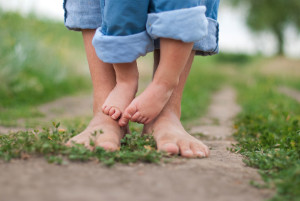
Dr. Kenneth Rosenthal
Dr. Jonathan C. O’Quinn
Dr. Michael J. Price

Dr. Kenneth Rosenthal
Dr. Jonathan C. O’Quinn
Dr. Michael J. Price

Among things that can go wrong at birth, newborn foot problems are common. Clubfoot describes an array of deformities that cause a newborn baby’s feet to be twisted, pointing down, and inward. About half of babies born with clubfeet have it in both of their feet. Boys are more likely to be born with this than girls. Clubfoot is not painful, but it can cause long-term problems and affect the child’s ability to walk. Another condition affecting newborns is metatarsus adductus. This is detected when a baby’s toes and forefoot are pointed inward, and it is difficult to straighten them. The baby’s sole resembles a bean. Polydactyly means that a baby has an extra toe or toes. This affliction can run in a family but is not necessarily genetic. Congenital vertical talus is an unusual cause of a type of flatfoot in newborns. With this, the sole of the baby’s foot looks like the bottom of a rocking chair. Congenital curly toes occur when a baby’s toes are abnormally rotated and in a bent position. Overlapping toes happen when the baby’s fifth digit (baby toe) crosses over the top of the fourth toe. With proper treatment, these conditions can be corrected or dealt with, sometimes with surgery, in early childhood. If you have a baby born with a congenital foot problem, please consult with a podiatrist for proper diagnoses and treatments.
Congenital foot problems require immediate attention to avoid future complications. If you have any concerns, contact one of our podiatrists of Eastern Carolina Foot & Ankle Specialists. Our doctors can provide the care you need to keep you pain-free and on your feet.
Congenital foot problems are deformities affecting the feet, toes, and/or ankles that children are born with. Some of these conditions have a genetic cause while others just happen. Some specific foot ailments that children may be born with include clubfeet, polydactyly/macrodactyly, and cleft foot. There are several other foot anomalies that can occur congenitally. What all of these conditions have in common is that a child may experience difficulty walking or performing everyday activities, as well as trouble finding footwear that fits their foot deformity. Some of these conditions are more serious than others. Consulting with a podiatrist as early as possible will help in properly diagnosing a child’s foot condition while getting the necessary treatment underway.
What are Causes of Congenital Foot Problem?
A congenital foot problem is one that happens to a child at birth. These conditions can be caused by a genetic predisposition, developmental or positional abnormalities during gestation, or with no known cause.
What are Symptoms of Congenital Foot Problems?
Symptoms vary by the congenital condition. Symptoms may consist of the following:
Treatment and Prevention
While there is nothing one can do to prevent congenital foot problems, raising awareness and receiving neonatal screenings are important. Early detection by taking your child to a podiatrist leads to the best outcome possible.
If you have any questions please feel free to contact our office located in Greenville, NC . We offer the newest diagnostic tools and technology to treat your foot and ankle needs.